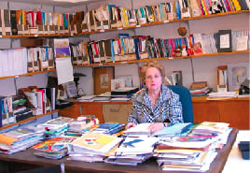Been There, Still Doing That
Jacqueline Ancess takes the long view on education reform in New York City.
It isn’t true that there’s nothing new in education in New York City. But as Jacqueline Ancess says, “many lessons have been learned”—and, sometimes, forgotten.
Ancess, Co-Director of TC’s National Center for Restructuring Education, Schools and Teaching (NCREST), has made the case for several of those lessons.
Ancess began her 23 years in the city’s public schools as an English teacher in the South Bronx, became a developer of district level programs and professional development for junior high schools, and then a junior high school administrator. From there she started a new small junior high in East Harlem when doing that was unheard of and then was named Director of Educational Options, overseeing development of other new small schools and school choice policies in a succession of Manhattan districts.
In that role, she developed a more equitable policy around gifted education, which, then as now, was seen by some as a means of drawing middle class families into the public school system, and by others as a tool for excluding low-income children.
“I went up to TC to talk to a gifted education expert, Jim Borland, and he got me to understand that using I.Q. or standardized tests to screen very young children for gifted education isn’t valid,” she recalls. “So our proposal included those tests, but did not screen on the basis of them.” The policy called for multiple assessments and indicators to identify gifted children “based not on their middle-classness, but on their demonstration of several behaviors that showed their potential.” Some parents resisted, Ancess says, but the proposal went through because of its strong basis in research.
Subsequently, after Ancess was offered a position in District 2, a group of parents pushed through a second gifted program, based solely on a 99th percentile standardized test score.
“You learn that if you’re not there to implement policies you believe in, the political winds change,” she says with a rueful smile.
Ancess made perhaps her most enduring and prescient contributions as a developer of new schools. She was the founding director of Manhattan East, and supported the development of the Delta Program, the NYC Lab School, Manhattan New School, East Side Middle School, and other institutions that are still thriving.
“There really were no programs then for school choice, so we created ‘option schools,’ which were in many ways like today’s charters,” she says. “You developed your own vision and pedagogy, hired your own teachers, and decided on the work rules.”
The option schools succeeded, Ancess says, because of the political leadership of educators such as then-district superintendent Anthony Alvarado and small schools champion Deborah Meier. Also, she says, because those involved had “a strong sense of community and commitment to children.”
Eventually Ancess—at the urging of Maxine Greene, whom she knew through Lincoln Center—enrolled at TC. She studied with Linda Darling-Hammond, who had just founded NCREST with Ann Lieberman, and was soon pursuing a doctorate and conducting a study for NCREST of performance assessments at a group of schools affiliated with the NYC Coalition of Essential Schools. She published a landmark book with Darling-Hammond, Authentic Assessment in Action: Images of Schools and Teachers at Work.
Since Darling-Hammond’s departure for Stanford, Ancess has co-directed NCREST with Gary Griffin, Betty Lou Whitford, and, currently, Thomas Hatch. She also has published numerous articles and a book, Beating the Odds: High Schools as Communities of Commitment.
Today NCREST strategically partners with schools and school-focused organizations, helping plan interventions and conduct formative assessment. It works with 31 high schools in New York City that partner with the Institute for Student Achievement to graduate conventionally underserved and underperforming students ready for college success. It partners with the National Consortium of Middle College High Schools, supporting data use and data-based decision-making for the organization’s more than 30 Middle College and Early College high schools. NCREST also helps 13 elementary schools do action research on their “DYOs,” or “do-your-own” math assessments—measurements of student learning that, unlike the city’s standardized assessments, track closely with the schools’ pedagogy and goals.
NCREST also works with Say Yes to Education, founded by the philanthropist George Weiss. Say Yes supports cohorts of economically disadvantaged public school children from kindergarten through high school in order to help them reach college, and then pays tuition for all who go on to college and other post-secondary education institutions. NCREST identified schools for Say Yes to support in Harlem and has served as the organization’s local partner since 2004, when Say Yes committed $50 million to support 300 students. With the children now preparing to move from elementary to middle school, NCREST is helping Say Yes to navigate the complicated NYC DOE middle school admission process and prepare the students to compete for the best middle schools. It also is conceptualizing enrichment programs, locating special services for the children, and more.
Ancess has had a complex career, but has no difficulty identifying its central theme.
“So many schools are dealing with kids for whom education will make or break their lives,” she says. “Providing them with support and encouragement and advocacy makes a difference.”
It’s a lesson that bears repeating.
Published Wednesday, May. 19, 2010
